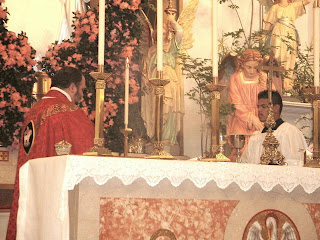The actual experiment was kind of cool. Getting to play with one of those van de graaff generators. You know the one where you put you hand on the ball and it makes your hair stand on end:

Well, imagine having a van de graaff generater that was two stories tall! We used it to shoot protons into a block of something I can't remember. But the protons would collide with the substance and shoot neutrons of a specific energy at the sample (either Ce-142 or Nd-144). The neutron would hit the nucleus of the atom and transfer some of it's energy to the nucleus of the sample, making it go to a higher energy level. It would then decay, releasing a photon. We would measure this photon's energy and be able to use that data to see various energy levels. My job was to help babysit the experiement, then crunch numbers and do computer analysis to find the energy levels as accurately as possible. It was pretty cool how you could predict some things just by the data. Anyway, science has always interested me.
So why the title to this post?
I came across a documentary on the Large Hadron Collider at CERN in Geneva, Switzerland.
I love the "frightful" opening squence of the video. Will it destroy the world?
I guess there has been concern. In looking at the LHC web page, if you look at the public web pages of CERN and it's description of the LHC, tucked at the end of the pages is a page that deals with the "safety concerns."
Are LHC collisions safe?
Microscopic black holes will not eat you...
Massive black holes are created in the Universe by the collapse of massive stars, which contain enormous amounts of gravitational energy that pulls in surrounding matter. The gravitational pull of a black hole is related to the amount of matter or energy it contains – the less there is, the weaker the pull. Some physicists suggest that microscopic black holes could be produced in the collisions at the LHC. However, these would only be created with the energies of the colliding particles (equivalent to the energies of mosquitoes), so no microscopic black holes produced inside the LHC could generate a strong enough gravitational force to pull in surrounding matter.
If the LHC can produce microscopic black holes, cosmic rays of much higher energies would already have produced many more. Since the Earth is still here, there is no reason to believe that collisions inside the LHC are harmful.
They even point out other articles that deal with this from other experiments:
Review of Speculative "Disaster Scenarios" at RHIC (pdf file)
The video is a pretty good video about the purpose of the LHC at CERN and the physics behind it. It also gives a very good overview of the relationship between cosmology and particle physics; two seemingly opposite areas of physics: study of the whole universe and study of the basic building blocks that make it up.
There's also some interesting video of just one of the detectors on the LHC the Atlas detector (sort of a crash course in particle physics ... pun intended ... "crash" course ... super collider ... nevermind)
I can't embed these particular videos, but you can see the videos on youtube:
The ATLAS Experiment - Mapping the Secrets of the Universe 1
The ATLAS Experiment - Mapping the Secrets of the Universe 2
It looks like the November 2007 date has been pushed back, so I think the LHC won't go online until 2008. Still, interesting stuff.
RS








































